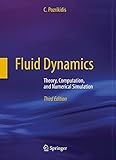Fluid Dynamics [electronic resource] : Theory, Computation, and Numerical Simulation / by C. Pozrikidis.
By: Pozrikidis, C [author.] .
.
Contributor(s): SpringerLink (Online service) .
.
Material type:  BookPublisher: New York, NY : Springer US : Imprint: Springer, 2017Edition: 3rd ed. 2017.Description: XIX, 901 p. online resource.Content type: text Media type: computer Carrier type: online resourceISBN: 9781489979919.Subject(s): Fluid mechanics
BookPublisher: New York, NY : Springer US : Imprint: Springer, 2017Edition: 3rd ed. 2017.Description: XIX, 901 p. online resource.Content type: text Media type: computer Carrier type: online resourceISBN: 9781489979919.Subject(s): Fluid mechanicsIntroduction to Kinematics -- More on Kinematics -- Flow Computation based on Kinematics -- Forces and Stresses -- Hydrostatics -- Equation of Motion and Vorticity Transport -- Channel, Tube, and Film Flow -- Finite-Difference Methods -- Low-Reynolds-Number Flow -- High-Reynolds-Number Flow -- Vortex Motion -- Aerodynamics.
This book provides an accessible introduction to the basic theory of fluid mechanics and computational fluid dynamics (CFD) from a modern perspective that unifies theory and numerical computation. Methods of scientific computing are introduced alongside with theoretical analysis and MATLAB® codes are presented and discussed for a broad range of topics: from interfacial shapes in hydrostatics, to vortex dynamics, to viscous flow, to turbulent flow, to panel methods for flow past airfoils. The third edition includes new topics, additional examples, solved and unsolved problems, and revised images. It adds more computational algorithms and MATLAB programs. It also incorporates discussion of the latest version of the fluid dynamics software library FDLIB, which is freely available online. FDLIB offers an extensive range of computer codes that demonstrate the implementation of elementary and advanced algorithms and provide an invaluable resource for research, teaching, classroom instruction, and self-study. This book is a must for students in all fields of engineering, computational physics, scientific computing, and applied mathematics. It can be used in both undergraduate and graduate courses in fluid mechanics, aerodynamics, and computational fluid dynamics. The audience includes not only advanced undergraduate and entry-level graduate students, but also a broad class of scientists and engineers with a general interest in scientific computing.


There are no comments for this item.